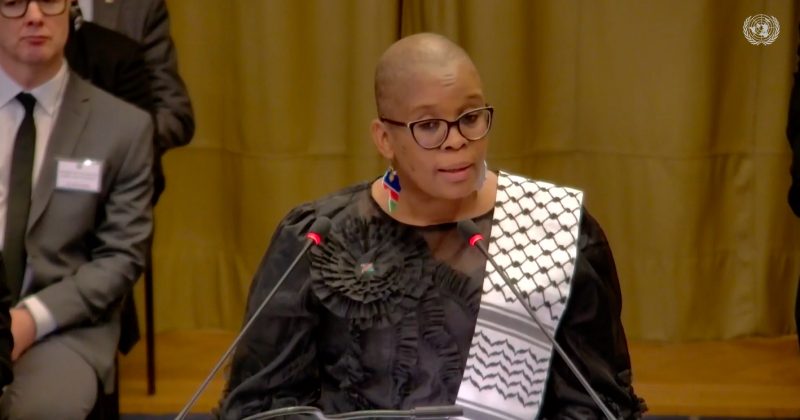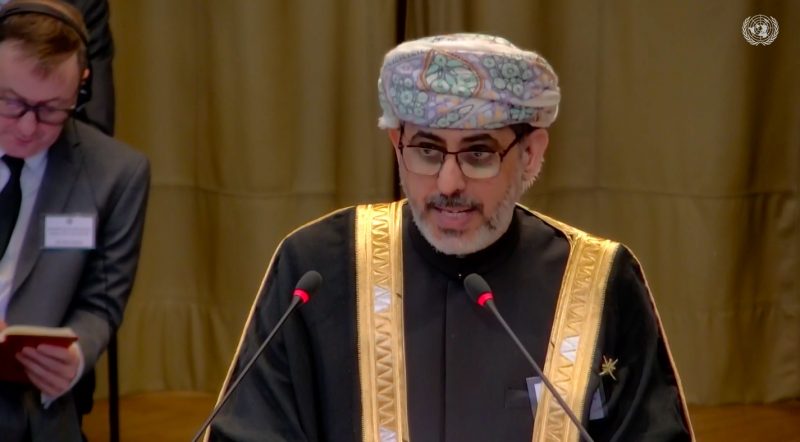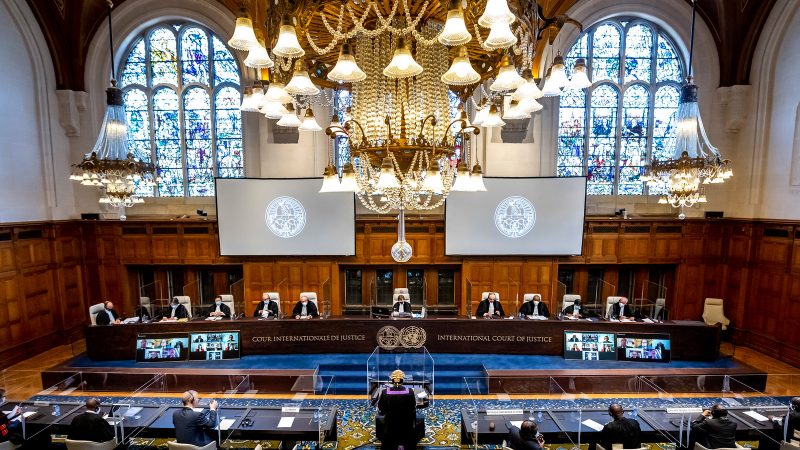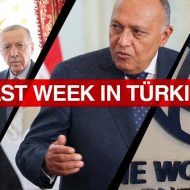Oral presentations before the International Court of Justice regarding Israel’s policies and practices in the Occupied Palestinian Territories including East Jerusalem continued on their 5th day.
The court has been asked by the UN General Assembly to provide a non-binding advisory opinion.
12 countries made their presentations. Among them was Namibia, itself a victim of apartheid, that emphasized that previous ICJ opinions played an important role for its independence.
Qatar, which has a strong influence on the Palestinian movement, emphasized that Israel’s attacks were threatening the international system and peace and stability as a whole.
Pakistan reminded that when Algeria was liberated from French colonial rule, 1 million French settlers had to leave the country.
Norway questioned, in a very diplomatic manner, whether Israel would today still qualify for UN membership.
The United Kingdom called the court to decline to give the advisory opinion, arguing it might affect the negotiation process between Israel and Palestine.
The Indonesian representative stated there’s no negotiation process if a gun points to one’s head.
All countries except the United Kingdom and Switzerland, demanded an immediate end to occupation and the withdrawal of Israeli forces from the occupied territories.
Tunisia, among others, accused Israel of committing genocide.
The hearing will end on Monday, February 26, with the presentations of Türkiye, Zambia, Spain, Fiji, the Maldives as well as the Organization of Islamic Cooperation, the League of Arab States and the African Union.
Below is a summary of the presentations given today, February Friday 23rd.
Namibia: Israel “should not be exempted from sanctions”
On behalf of Namibia spoke Yvonne Dausab, Minister of Justice and Phoebe Okowa, Professor of Public International Law, University of London, Legal Counsel.
Dausab began reminding that Namibia had suffered “the first genocide in the 20th century” and knows “too well the suffering of occupation, colonialism, systematic discrimination, apartheid”.
“The parallels between Namibia and Palestine are striking and painful”, she said, adding that “reality of the people of Palestine evokes painful memories for many Namibians of my generation”.
She underlined previous advisory opinions of the ICJ had played a “vital role” in paving the way to independence for Namibia.

The Namibian representative called the situation in Palestine “hell on earth” and stated that “civilized nations cannot and must not accept” it.
She also addressed the Palestinian people themselves: “A people united will always emerge victorious”, Dausab said.
The second speaker on behalf of Namibia, Professor Okawa, addressed the court specifically on the question of apartheid, a crime that Namibia had also suffered. Several delegations mentioned during the hearings the case South Africa versus Namibia with rulings of international courts.
The court “should make it clear that the prohibition of apartheid is not limited to Southern Africa in the last century”, Okawa said. She demanded to establish apartheid as a preemptory norm and to clarify its definition.
Okawa stated, “The Israeli government’s openly articulated aim is to ensure Jewish-Israeli control of all facets of Palestinian life as evidenced by legislation affirming Israel as a nation-state of the Jewish people with unique self-determination rights reserved for Jewish individuals only.”
It was fragmenting the Palestinian people in the occupied territories into administrative units, thus eliminating their collective identity, Okawa said.
Calling the court to set a “strict time limit” to end occupation, “No state should be exempted from the comprehensive regime of sanctions”, Okawa concluded.
Norway: Questioning Israel’s UN membership
Kristian Jervell, Director General, Legal Department, Ministry of Foreign Affairs and Rolf Einar Fife, ambassadeur en mission spéciale, Ministry of Foreign Affairs spoke on behalf of Norway.
Jervell expressed “utmost concern” given the “indiscriminate and disproportionate use of force in the Gaza Strip and the illegal settlements in the West Bank”. “House evictions, demolitions forced displacement and settler violence” do, according to the Norwegian representative, “threaten the foundations of international law”.
Attacks of Hamas do “not justify inciting or taking measures directed against civilian population”, Jervell stated.
The Director General continued: “Actions by Israel constituting de facto annexation include expropriating land and natural resources, establishing settlements and outposts, maintaining a restrictive and discriminatory planning and building regime for Palestinians, and extending Israeli law extraterritorially to Israeli settlers in the West Bank.”
Quoting Israeli Prime Minister Netanyahu’s words of 2019, who had claimed that his “government would be applying Israeli sovereignty over all the communities to which Israeli settlers had been transferred”, Jervell commented: These words “may constitute direct and public incitements to commit serious violations of international law”.
Speaking as second representative, Rolf Einar Fife reminded of the historic process of Israel’s admission to UN membership. He recalled the words of the Israeli politician Abba Eban, who during the application had asked whether “the time had come for the UN, if it wished Israel to bear the heavy burden of charter obligations to confer upon Israel.”
“Such declarations were instrumental in securing a majority of votes in the relevant organs of the United Nations” for Israel’s membership in the UN, Fife state and concluded they “may also give rise to legal circumstances”.
Oman: Court should bring Israel to end this unlawful situation
The Sultanate of Oman was represented by Sheikh Abdullah Al Harthi, Ambassador to the Kingdom of the Netherlands.
“Today in Gaza, the world is witnessing since four months one of the worst atrocities and acts of genocide inmodern times”, Al Harthi said, adding that 25 thousand people were killed and 69 thousand wounded, with 2.2 million living under unbearable conditions.
The Oman ambassador reminded that the Security Council had “recognized the inalienable, permanent and qualified tight to self-determination of the Palestinian people”.
This demanded “the immediate cessation of all illegal acts including settlements and associated legal and administrative frameworks”, Al Harthi stated.
“The court should determine that Israel should bring an immediate and unconditional end to this unlawful situation”, the ambassador concluded.

Pakistan: France had to withdraw settlers from Algeria
Ahmed Irfan Aslam, Federal Minister for Law and Justice, represented Pakistan.
“These proceedings take place as a whole people struggle to survive through relentless bombardment. The very people who have endured daily persecution for over half a century”, began Aslam his words.
The Pakistan representative said the Israel’s “occupation is no longer occupation. It is annexation. In East Jerusalem, the annexation is de jure, in the rest de facto”.
He also quoted Ben-Gurion, the founder and first Prime Minister of Israel with the words “the Israeli Empire must comprise all the territories between the Nile and the Euphrates”.
But still, reminded the Pakistani speaker, had France to withdrew 1 million settlers from Algeria when that country became independent, “not only more numerous, but they were also far older and better established than Israel’s West Bank colonies.”
Aslam reiterated Pakistan’s belief that “two-state-solution must be the basis for peace”. He demanded the immediate cessation of Israel’s activities, its immediate and unconditional withdrawal”.
Introducing another principle of international law that a state should not benefit from wrongdoing, Aslam reminded of the court’s rulings in regard to Namibia. Acknowledging that the Security Council was unanimous at that case, he still insisted that the rulings provided a legal base to treat the Palestinian situation as well, despite ongoing vetoes in the Council.
Indonesia: “Holding a gun at your head is not a negotiation”
Indonesia was represented by Retno L. P. Marsudi, Minister for Foreign Affairs.
Marsudi called the Palestinian issue “a matter of supreme and grave importance”, and declared to stand in the court “to defend justice against the blatant violation of international law by Israel”.
“Israel’s unlawful occupation and its atrocities must stop”, said the Minister, adding “Israel has zero intention to respect, let alone abide by its international legal obligation”.
“Apparently the death of almost 30,000 lives is not enough for Israel as it is close to strike on Rafah, once the only gateway for life-saving humanitarian assistance to Gaza”, said Marsudi calling the ICJ to maintain the rules-based international order.
Some states objected to the court providing an opinion, arguing that it might had affect negatively a negotiation process. “There is no viable peace process, holding a gun to your head is not negotiation”, answered the Indonesian minister.
“Given the illegal nature of the occupation, Israel’s withdrawal must neither be done with precondition nor subject to any negotiation. They must withdraw now. I repeat, they must withdraw now”, said the Indonesian Foreign Minister.
Qatar: International legal order “under threat”
On behalf of Qatar spoke Mutlaq Bin Majed Al-Qahtani, Ambassador to the Kingdom of the Netherlands.
Al Qahtani said “recent events have underscored that international legal order is under threat”, with a growing perception in some quarters of the world that international law applies to some but not to others”.
“The Palestinian people have been treated as an exception to the international rule of law”, the Qatari ambassador added, calling “Israel’s genocidal war the most pressing threat to international peace and security”.
Israel has “ethnically cleansed and colonized Palestinian lands” and established an “apartheid regime with the intent to maintain the domination of Jewish Israelis over Palestinians.”
The Qatari ambassador described settler colonial projects, the policy of displacement of Palestinians, where since October 7 only 13 communities were torn apart. Al Qahtani also explained “strategic fragmentation” of the Palestinian population and the “discriminatory ad unlawful violence” it faces in addition to the “discriminatory military legal system” established in the territories.
He then continued to describe the eradication ad suppression of all manifestation of Palestinian culture and religion and the economic repression as well as the “systemic persecution and suppression” the Palestinians endure.
Describing why the occupation is illegal, the Qatari representative concluded by expressing hope that the “court will seize historic opportunity to finally bring an end to a century of injustice against the Palestinian people”.
United Kingdom: The court should decline to provide an opinion
On behalf of the United Kingdom spoke Sally Langrish, its Representative before the International Court of J ustice, and Dan Sarooshi, KC, Professor of Public International Law, University of Oxford.
Langrish stated first her country’s commitment to a “negotiated two-state solution as the only way to end Israel’s occupation”. According to her, Israel “suffered the worst terrorist attack” and now, Palestinians “face a desperate humanitarian crisis in Gaza”. “The United Kingdom wants to see an immediate suspension of the fighting in Gaza”, she added.
The British representative also stated she would “not accept certain characterizations of Israel’s actions” nor “our own conduct” that she had “hear over the course of the week”.
The representative of the United Kingdom then requested the court “not to provide the opinion” that the UN General Assembly had demanded.
The second representative of the United Kingdom presented his argumentation why the court should decline the answer.
He stated the matter was “a dispute between two parties” of an acute sensitivity and that the request “engages” that dispute. As a third point, he emphasized the “requested relief”. Finally, Sarooshi emphasized that Israel had not consented to the dispute being resolved by the court.
According to the British representative, the “sheer scale and complexity of the factual determinations is the problem”. He referred to “30.000 pages” of UN documents, to which according to Sarooshi the United Kingdom had “reservations”.
Resembling the US argument presented in the court, Sarooshi said the UN framework “inextricably links withdrawal with security”. “An unconditional court directed at only one party undermines Israeli withdrawal by negotiation”, the British representative said.
Taking back to the floor, Langrish presented a proposal in case the court “minded to provide an opinion”. She proposed to “narrow the scope of its answer” and “focus on endorsing the continued application of the agreed framework with a view of its urgent implementation.
For the United Kingdom, this is an agreement on the borders, security arrangements for both Israel and the Palestinians, and a satisfactory agreement that establishes Jerusalem as the capital of both.
Until then, stated Langrish, should the court simply call the sides “not to alter the status of of the occupied territories”.
Slovenia: Occupation and annexation must end
On behalf of Slovenia spoke Helmut Hartman, Legal Adviser at the Embassy in the Kingdom of the Netherlands and Daniel Müller, member of the Paris Bar.
Speaking first, Hartmann rejected the United Kingdom’s argument, stating “this Court’s role is to identify existing principles and rules, interpret them, and apply them”. He added that “a mutual agreed solution seems to be more and more uncertain”.
Speaking as second representative for Slovenia, Müller explained how Israel was “actively preventing “is actively preventing the full realization of the Palestinians’ right to self-determination in compliance with the guarantees and principles of international law”.
He called Israel to put an end to the “prolonged occupation and annexation of Palestinian territory. Müller expressed hope that the court “can put an end to the unbearable and unacceptable situation in the region and work for a just and lasting peace in which every state in the area can live in security.”
Sudan: Objections against the court invalid
Sudan was represented by Marwan A. M. Khier, Chargé d’affaires, in the Embassy in the Kingdom of the Netherlands and Fabián Raimondo, Associate Professor of Public International Law.
Khier stated “critical importance in persuading the court to exercise its jurisdiction and accept the request the request for an advisory opinion”.
Raimondo then explained on behalf of Sudan why the objections the court providing an opinion, advanced among others by the United Kingdom, Canada and Hungary, were invalid.
The opinion can “significantly contribute to establishing a groundwork for a negotiated solution”, said the lawyer, and added that lack of consent had also not kept the court from presenting an opinion.
Raimondo finally said given the UN Security Council, General Assembly and Specşak Rapporteur reports, the court was provided “sufficient information on the facts” to give an opinion.
Switzerland: Obligations of the occupation authority
Franz Perrez represented the Swiss government before the International Court of Justice.
Perez held a presentation without entering facts of the occupied territories. Instead, he deduced from the international law of occupation rules and possible violations in Israel’s conduct in Palestine.
“The adoption of measures such as planning, zoning contributes to put in place a coercive environment, aggravating the risk of forced transfer”, stated the expert.
He urged that the occupying authority is “required” to work “as a priority through local authorities and institutions in favour of the local population”.
“The use of resources fort he need of the occupier claerly run counter” the law of occupation, the Swiss representative stated, adding that the “use of force must always be personalized”. Perrez implicitly rejected thus any form of collective punishment, but without accusing Israel to do so.
He also called authorities to investigate acts of violence committed by settlers, deducing it from the obligation to protect the local population.
“In spirit, Israel and Palestine must cooperate and support one another mutually and not weaken one another or erode the authority of the other party”, concluded the Swiss representative Perrez.
Syria: Impunity made Israel think “it is above law”
Syria was represented by Ammar Al Arsan, Head of the country’s Permanent Mission to the European Union.
Al Arsan stated that the “stability of the Middle east and the credibility of the United Nations system, including the ICJ, required taking measures to implement all relevant international resolutions to end Israeli occupation in all Arab countries”.
“But”, added the Syrian representative, “currently we are Israel committing genocide in the occupied territories, in Gaza, attacking Syria, attacking Lebanon and committing war crimes and crimes against humanity.”
This happens because “Israel is considering itself above law” as it has been carrying out illegal occupation and committing crimes “for 75 years without facing accountability”.
He expressed hope that the advisory opinion of the ICJ may begin to change the situation.
Tunisia: Israel commits genocide
On behalf of Tunisia spoke Slim Laghmani, Professor of Public International Law.
Laghmani called the expression occupation an “euphemism”, given de Israel’s annexation of Palestinian territories and “the war of annihilation” since October 7.
Delving into the history of the conflict, Laghmani reminded that back in 1922, the League of Nations had recognized the nation of Palestine, preparing to hand over the entire territory to it once the mandate finished.
But subsequently, details of the Balfour Declaration as well as a number of UN General Assembly and Security Council resolutions were, “as they say to their deeply regret”, not fulfilled, stated the Tunisian representative.
As of today, the crime of genocide is proven both in the infliction of damage to the Palestinians as well as the intent to destroy them, said Laghmani.
He finished by emphasizing this was the content of the case opened by South Africa against Israel before the court on November 17, 2023.









Leave a Reply